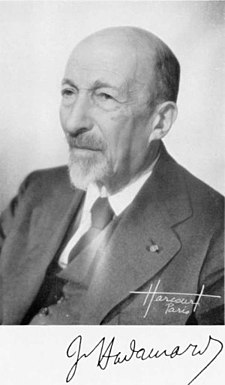Jacques Hadamard
| Jacques Hadamard | |
|---|---|

Jacques Salomon Hadamard
|
|
| Born |
8 December 1865 Versailles, France |
| Died | 17 October 1963 (aged 97) Paris, France |
| Residence | France |
| Nationality | French |
| Fields | Mathematician |
| Institutions |
University of Bordeaux Sorbonne Collège de France École Polytechnique École Centrale Paris |
| Alma mater | École Normale Supérieure |
| Thesis | Essai sur l'étude des fonctions données par leur développement de Taylor (1892) |
| Doctoral advisor |
C. Émile Picard Jules Tannery |
| Doctoral students |
Maurice René Fréchet Marc Krasner Paul Lévy Szolem Mandelbrojt André Weil Xinmou Wu |
| Known for |
Hadamard product Proof of prime number theorem Hadamard matrices |
| Notable awards |
Grand Prix des Sciences Mathématiques (1892) Prix Poncelet (1898) CNRS Gold medal (1956) |
Jacques Salomon Hadamard ForMemRS (French: [adamaʁ]; 8 December 1865 – 17 October 1963) was a French mathematician who made major contributions in number theory, complex function theory, differential geometry and partial differential equations.
The son of a teacher, Amédée Hadamard, of Jewish descent, and Claire Marie Jeanne Picard, Hadamard was born in Versailles, France and attended the Lycée Charlemagne and Lycée Louis-le-Grand, where his father taught. In 1884 Hadamard entered the École Normale Supérieure, having placed first in the entrance examinations both there and at the École Polytechnique. His teachers included Tannery, Hermite, Darboux, Appell, Goursat and Picard. He obtained his doctorate in 1892 and in the same year was awarded the Grand Prix des Sciences Mathématiques for his essay on the Riemann zeta function.
In 1892 Hadamard married Louise-Anna Trénel, also of Jewish descent, with whom he had three sons and two daughters. The following year he took up a lectureship in the University of Bordeaux, where he proved his celebrated inequality on determinants, which led to the discovery of Hadamard matrices when equality holds. In 1896 he made two important contributions: he proved the prime number theorem, using complex function theory (also proved independently by Charles Jean de la Vallée-Poussin); and he was awarded the Bordin Prize of the French Academy of Sciences for his work on geodesics in the differential geometry of surfaces and dynamical systems. In the same year he was appointed Professor of Astronomy and Rational Mechanics in Bordeaux. His foundational work on geometry and symbolic dynamics continued in 1898 with the study of geodesics on surfaces of negative curvature. For his cumulative work, he was awarded the Prix Poncelet in 1898.
...
Wikipedia
